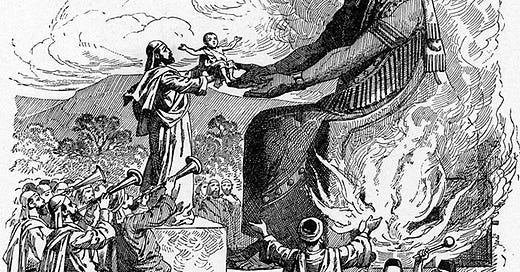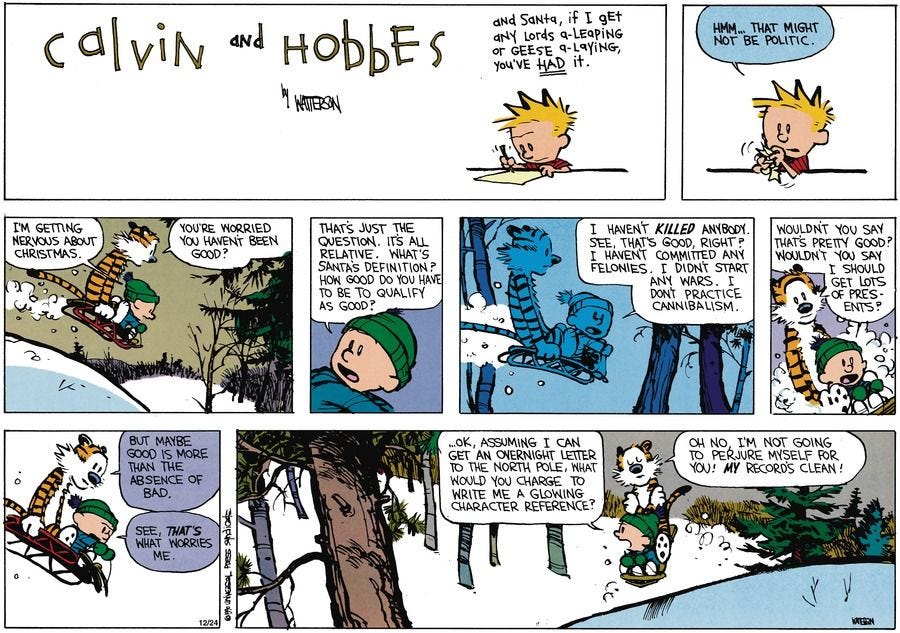I think I’ve used this comic before, but it applies to today’s Gospel, so I’m using it again.
Reading I
Jgs 2:11-19
The children of Israel offended the LORD by serving the Baals. Abandoning the LORD, the God of their fathers, who led them out of the land of Egypt, they followed the other gods of the various nations around them, and by their worship of these gods provoked the LORD.
Because they had thus abandoned him and served Baal and the Ashtaroth, the anger of the LORD flared up against Israel, and he delivered them over to plunderers who despoiled them. He allowed them to fall into the power of their enemies round about whom they were no longer able to withstand. Whatever they undertook, the LORD turned into disaster for them, as in his warning he had sworn he would do, till they were in great distress. Even when the LORD raised up judges to deliver them from the power of their despoilers, they did not listen to their judges, but abandoned themselves to the worship of other gods. They were quick to stray from the way their fathers had taken, and did not follow their example of obedience to the commandments of the LORD. Whenever the LORD raised up judges for them, he would be with the judge and save them from the power of their enemies as long as the judge lived; it was thus the LORD took pity on their distressful cries of affliction under their oppressors. But when the judge died, they would relapse and do worse than their ancestors, following other gods in service and worship, relinquishing none of their evil practices or stubborn conduct.
While there is an obvious reason “You shall have no other gods before Me” is the first commandment (i.e. it’s true), there’s something less obvious. When we let other things become the center of our lives, suddenly a whole world of horrifying possibilities opens up to us, up to and including child sacrifice (as today’s psalm mentions).
God punishes the Israelites for their crimes, not only against Himself, but each other.
When we make God the center of our lives, on the other hand, it brings us closer to each other. God is love, so loving your neighbor is a direct corollary of loving God. We have to put God first, or everything else is going to fall apart.
Responsorial Psalm
106:34-35, 36-37, 39-40, 43ab and 44
R. Remember us, O Lord, as you favor your people.
They did not exterminate the peoples,
as the LORD had commanded them,
But mingled with the nations
and learned their works.
R. Remember us, O Lord, as you favor your people.
They served their idols,
which became a snare for them.
They sacrificed their sons
and their daughters to demons.
R. Remember us, O Lord, as you favor your people.
They became defiled by their works,
and wanton in their crimes.
And the LORD grew angry with his people,
and abhorred his inheritance.
R. Remember us, O Lord, as you favor your people.
Many times did he rescue them,
but they embittered him with their counsels.
Yet he had regard for their affliction
when he heard their cry.
R. Remember us, O Lord, as you favor your people.
This once again relates to the podcast episode I mentioned a few days ago— “A Land of Giants.” God had commanded the Israelites to wipe out or assimilate all of the inhabitants of Canaan. They didn’t.
Because of this, the Israelites allowed themselves to be corrupted by pagan cultures (as mentioned in the first reading). They even sacrificed their children to false gods. You’d think the bare minimum would be don’t kill your own children, but their culture embraced the horror. Can you imagine?
Alleluia
Mt 5:3
R. Alleluia, alleluia.
Blessed are the poor in spirit;
for theirs is the Kingdom of heaven.
R. Alleluia, alleluia.
It is extremely difficult for a rich person to acknowledge they depend on anyone, even God. That’s what’s meant by “poor in spirit”—our dependance on God’s mercy is no different than a poor person’s dependance on charity.
Gospel
Mt 19:16-22
A young man approached Jesus and said, “Teacher, what good must I do to gain eternal life?”
He answered him, “Why do you ask me about the good? There is only One who is good. If you wish to enter into life, keep the commandments.”
He asked him, “Which ones?”
And Jesus replied, “You shall not kill; you shall not commit adultery; you shall not steal; you shall not bear false witness; honor your father and your mother; and you shall love your neighbor as yourself.”
The young man said to him, “All of these I have observed. What do I still lack?”
Jesus said to him, “If you wish to be perfect, go, sell what you have and give to the poor, and you will have treasure in heaven. Then come, follow me.” When the young man heard this statement, he went away sad, for he had many possessions.
Like Hobbes (the tiger, not the philosopher) said, “Maybe good is more than the absence of bad.”
Jesus didn’t condemn earthly riches as such; He had several wealthy disciples. But in this case, this rich, young man needed to sell everything to grow closer to God. We know this, because he was sad, despite having many possessions. His riches weren’t helping him any (probably because he wasn’t helping others with his wealth.)
Not doing bad things is a start; we have to do good, as well. But there is only One who is truly good—God. So we have to figure out what’s keeping us from Him, what’s blocking our path to God and eternal life. Wealth, fame, gossip, lazy internet scrolling, fancy food, drink, whatever it is. If Jesus Himself asked us to give them up, would we walk away sad?






Very thought provoking.